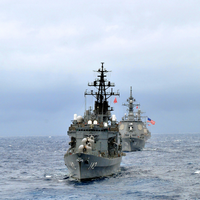When the Tohoku earthquake and tsunami struck Japan on March 11, the Japanese Self-Defense Force (JSDF) coordinated and carried out the initial response to the catastrophe. For the first time ever, the ground, air and sea components of the JSDF formed a joint task force for dealing with the disaster. With the support of the United States Navy, the JSDF has assisted with relief of stricken areas and the general management of the disaster. It is no exaggeration to say that the earthquake has spurred the most significant Japanese military operations since the end of World War II.
The experience gained through this tragedy has left the Japanese military well-positioned to play an influential role in several key tasks expected to gain prominence for the world's armed forces in the future. While "hard" military tasks will remain important, opportunities for states to use their militaries for political influence extend beyond warfighting. Some of the most important missions carried out by the U.S. military in the past 10 years have involved operations other than war, most notably disaster relief in Pakistan, Southeast Asia and Haiti. The JSDF's experience with such operations gives it the potential to be an enormously influential tool of Japanese statecraft.
Political and legal objections to a heightened profile for the JSDF remain, both abroad and at home. The JSDF continues to occupy a controversial position in Japanese public opinion, although attitudes have shifted in the past decade. Following the 1995 Kobe earthquake, Prime Minister Tomiichi Murayama came under heavy criticism for his slow deployment of the JSDF. The Social Democratic Party was not fully comfortable with the existence of the JSDF, much less its vigorous use in domestic disaster relief. The JSDF's response following the Tohoku quake was far more vigorous, in part because of changes in the legal and political environment surrounding its use. The administration of Prime Minister Junichiro Koizumi represented a major shift in the Japanese governmental attitude toward military capabilities. During Koizumi's tenure, the Japanese Maritime Self-Defense Force (JMSDF) carried out refueling operations in the Indian Ocean for U.S. forces engaged in the Afghanistan War, while the JSDF conducted relief work in Iraq. Neither of these involved "tip of the spear" military operations, but both allowed Japanese forces to operate farther afield than they had become accustomed to since the end of World War II. Under Koizumi, Japan also pursued a more assertive foreign policy, including closer ties with the United States and a more aggressive response to North Korean provocations.

